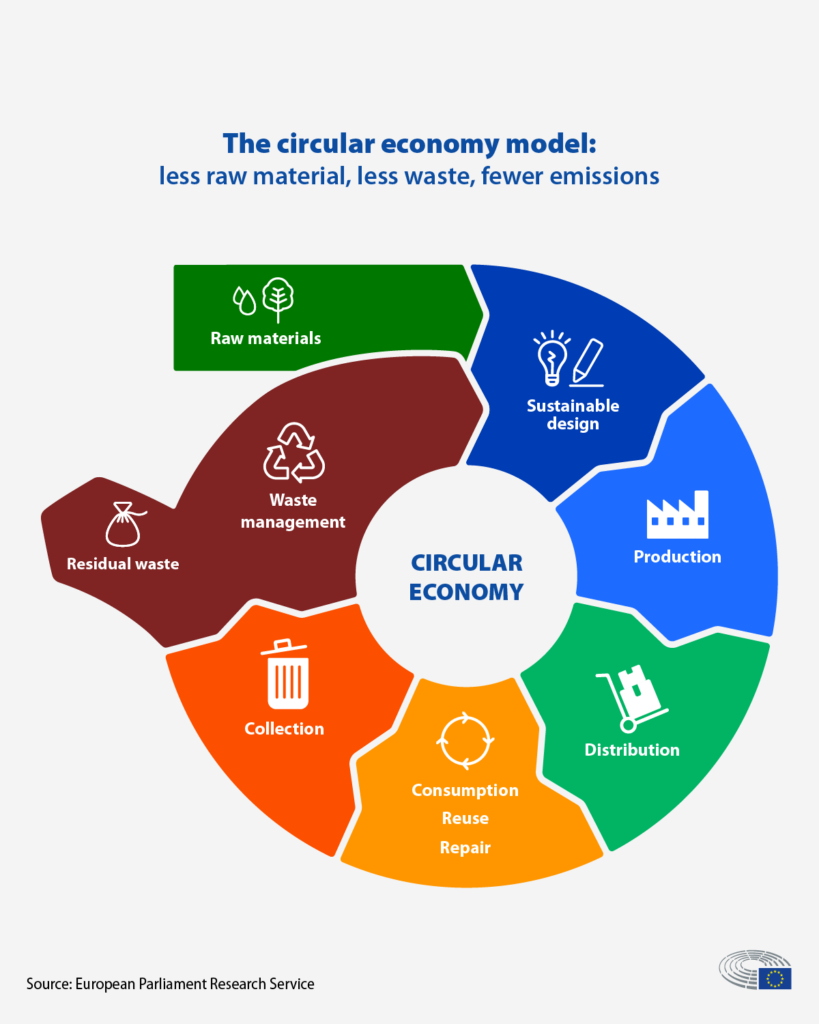In recent years, the circular economy model has gained renewed attention as a promising alternative to our current system. Not only is it inherently more sustainable and environmentally friendly, it also promotes economic resilience and vast untapped potential for long-term growth. Micro, small and medium enterprises (MSMEs) in particular stand to benefit significantly from the transition towards circularity, while themselves being well-positioned to catalyze it due to their unique attributes and inherent adaptability.
Disadvantages of the Linear Economy
The flaws of today’s traditional, linear economic model – where we take raw materials from the Earth, make products from them, and eventually throw them away as waste – have long been recognized. Left unchecked, this resource and energy-intensive approach often leads to overexploitation, while generating vast quantities of waste and pollution: one estimate suggests that 45 percent of global greenhouse gas emissions can be attributed to modern production and consumption patterns. The trade-off between short-term gains and long-term ecological sustainability is nothing new, but the more that our finite resources are depleted, the more that the potential returns will diminish.
Environmental degradation is only part of the picture; the present system is highly susceptible to supply chain disruptions and price volatility. This vulnerability was brought into sharp focus by COVID-19, where restrictions to mobility exacerbated market shocks and gave us an idea of what the consequences of resource scarcity could look like in the long run. Then there’s the social impact – just like the pandemic, marginalized and underprivileged communities tend to be disproportionately affected.
A More Sustainable Alternative
On the other hand, the circular economy is designed to minimize waste and pollution. By reusing, repairing, recycling – and so on – resources are kept within the economic loop as long as possible. To put it simply, the materials can be used again and again, so they continue to create value.

Embracing circularity doesn’t just decouple economic activity from the consumption of finite resources, it also creates new opportunities for growth. For example, designing products to be sustainable can foster innovation, creating job opportunities while potentially saving costs and improving operational efficiency. A 2015 Accenture study estimated that the transition towards a circular economy could generate $4.5 trillion of additional economic output by 2030, while the International Labour Organization projects a net increase of 6 million jobs – all while helping to restore our natural systems.
A Symbiotic Relationship with MSMEs
To MSMEs – which often face challenges in obtaining the funding and resources they need to grow – resource optimization and operational efficiency can make the difference between thriving and merely surviving. They also tend to be more susceptible to market fluctuations, and therefore gain an advantage from the inherent stability and resilience that the circular economy offers. Moreover, with growing awareness about climate change and increased societal demand for businesses to be environmentally responsible, a commitment to circular principles can help small businesses build their brand reputation and stand out in a competitive marketplace.
At the same time, MSMEs are also well positioned to pioneer a paradigm shift towards circularity, perhaps more so than their larger counterparts. For starters, they tend to be more agile and flexible, with less red tape and bureaucracy to deal with when it comes to implementing change or responding swiftly to shifting demands. Adopting new practices, processes, or technology quickly is often part and parcel of staying relevant and competitive.
MSMEs are also known to be key drivers of innovation. Necessity is the mother of invention, and market competition and resource scarcity create the need for greater efficiency and creativity. Transitioning to a circular economy often involves developing novel solutions, products, and processes. For example, integrating circular principles into the design process, or “designing for circularity”, is integral to extending their durability and reusability – more than 80% of a product’s environmental impact is determined during this phase. Leveraging innovative approaches can lead to sustainable and desirable products and services that align with both environmental goals and shifting consumer demands.
The connections between MSMEs and their communities, customers, and stakeholders are often extensive. They tend to be deeply rooted as part of their local societies, with collaboration and partnerships being in many cases, almost second nature. Such collaboration is vital in driving the circular economy. Sharing best practices and knowledge between MSMEs and along the value chain can greatly speed up the adoption of circular principles, while reducing risks and costs. Involvement with industry associations and NGOs can provide a two-way channel for access to valuable resources and expertise, especially when it comes to dealing with regulatory frameworks.
Supporting the Transition
Of course, some MSMEs may have limited awareness or understanding of the circular economy in the first place, while others may lack formal avenues for collaboration and sharing. Industry associations and third-party organizations like BBX can provide a platform for such activities. For example, we regularly host networking events for business owners in our communities – these provide a conducive environment for discussion and the dissemination of information. By building knowledge and awareness, MSMEs are able to make informed decisions and identify suitable opportunities for innovation and change.
Communities of MSMEs demonstrate greater potential and amplified economic impact; likewise, their contributions in terms of sustainability can be equally significant. Collectively, they can act as a strong force for advocacy, driving systemic change to create an environment conducive for circular economy practices.
A major challenge towards creating such an ecosystem would be overcoming initial financial limitations. Diverting resources towards innovation or the adoption of new processes may not always be feasible, even after taking the potential returns into account, and obtaining credit from traditional sources like banks can be notably difficult. Alternative sources of interest-free financing, such as our own digital trade credit (DTC) system, can help MSMEs circumvent such budget constraints and reducing the barriers they face when it comes to implementing sustainable initiatives. This also enables them to conserve cash, improving overall financial stability and giving them more leeway to plan for the future.
Ultimately, the responsibility for driving the transition to a circular economy is not just held by businesses alone, but equally shared between all stakeholders along the value chain. As an international B2B digital trading platform, we are committed to empowering MSMEs with an alternative means of financing and settlement, as well as creating avenues for them to leverage their underutilized goods and services in the interest of resource optimization and eliminating waste. We believe corporate success and global wellbeing should go hand in hand; by driving change towards a circular economy together, we can foster sustainable growth while safeguarding our planet for future generations.

